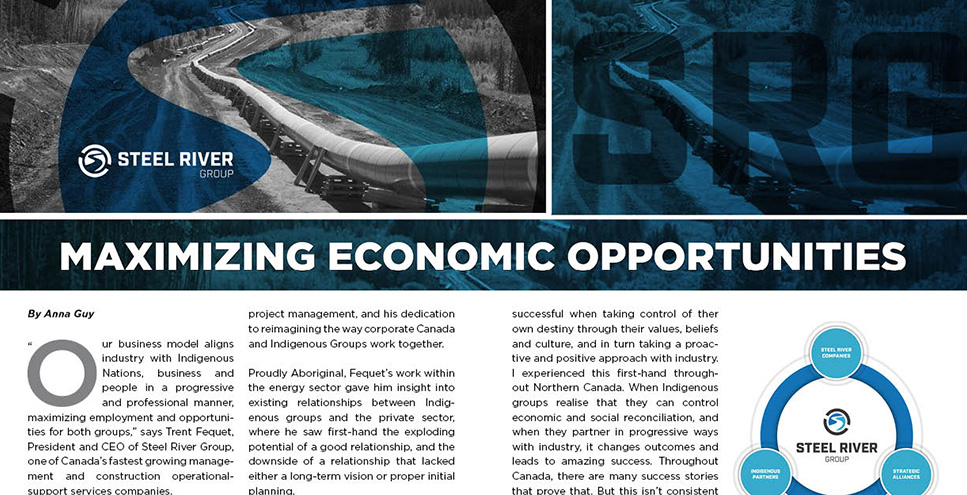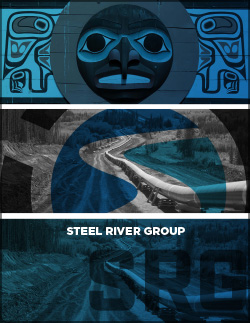Maximizing Economic Opportunities
By Anna Guy
Our business model aligns industry with Indigenous Nations, business and people in a progressive and professional manner, maximizing employment and opportunities for both groups,” says Trent Fequet, President and CEO of Steel River Group, one of Canada’s fastest growing management and construction operational-support services companies.
Steel River Group was born from Fequet’s decades-long career in construction and project management, and his dedication to reimagining the way corporate Canada and Indigenous Groups work together.
Proudly Aboriginal, Fequet’s work within the energy sector gave him insight into existing relationships between Indigenous groups and the private sector, where he saw first-hand the exploding potential of a good relationship, and the downside of a relationship that lacked either a long-term vision or proper initial planning.
“My experience was twofold,” explains Fequet. “First Nations have been very successful when taking control of ther own destiny through their values, beliefs and culture, and in turn taking a proactive and positive approach with industry. I experienced this first-hand throughout Northern Canada. When Indigenous groups realise that they can control economic and social reconciliation, and when they partner in progressive ways with industry, it changes outcomes and leads to amazing success. Throughout Canada, there are many success stories that prove that. But this isn’t consistent throughout Canada, and there are also plenty examples of unsuccessful partnerships.”
As a result of Fequet’s experience, Steel River Group created its Indigenous Inclusion Ecosystem model, which is premised around creating alignment between three critical groups: Steel River companies; Indigenous partners; and alliance or industry partners. The company brings these entities together under a shared vision and goals and creates agreements, joint venture partnerships and new subsidiary companies to build capacity and strengthen competency. As a management entity, Steel River Group supports corporate governance, structure, and provides support to its own group of companies.
Fequet says the challenge is that no two business partnerships are alike, and understanding these nuances is at the core of Steel River Groups success—understanding that each Nation comes to the table with their individual circumstances in terms of business beliefs, resources, goals, demographics, and capacity.
Steel River Group approaches each potential partnership by first working with the First Nation to build its capacity and by supporting them in a myriad of ways to better prepare them to capitalize on project opportunities.
Founded in 2016, Steel River Group has already made a significant impact, having far surpassed its five-year goals in its first 12. Its success speaks for itself; for example, its work with Alexis Nakota Sioux Nation. “Through our relationship with Alexis Nakota Sioux Nation, we helped them increase their operational excellence to maximize the success of Backwoods Energy Services, an existing business they owned and operated,” says Fequet. “When we first partnered with them, they were experiencing annual revenues around $15 million a year and employed 20-plus band members. In 18 months, we increased that figure to $90 million and created employment opportunities for every available and interested band member. Backwoods Energy Services now employs over 250 Indigenous folks and provides an optimistic future for many families.”
Steel River Group also works closely with Horse Lake First Nation’s Chief and Council, supporting Horse Lake Oilfield Construction Corporation’s day-to-day operations while expanding the scope of services through its subsidiaries.
“Throughout my career, I have been approached by Indigenous and non-Indigenous individuals and companies interested in what I was doing,” says Fequet. “With Steel River Group, we now have a platform and structure to support them in opening their own business or partnering with us.”
The company has since opened several subsidiary companies. Steel River Group owns majority shares in a pipeline company, a management company, a water transfer and treatment company and an equipment company, to name a few. Through these subsidiaries, Steel River Group offers a diverse range of services to plan, build, and maintain projects from beginning to end for any element of an oil and gas, mining, construction, infrastructure, or civic project. “All companies within Steel River Group share a common vision of having a meaningful, positive impact for its people and partners,” says Fequet.
“Our model of linking Indigenous groups to the private sector isn’t new, but we believe our ability to integrate an exhaustive and informational blueprint to a diverse range of groups has the best potential to maximize employment and prepare for a very strong, long-term economic benefit to the Nations we work with,” says Fequet. “Success, pride in ownership and self-sustainability are our goals.”







